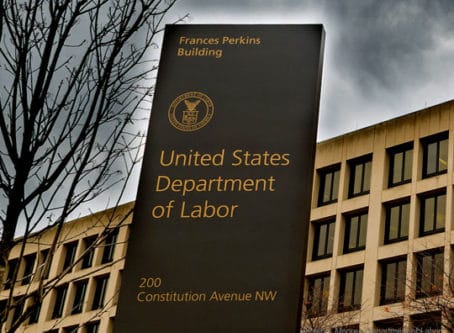Luke Hinrichs is a student at Harvard Law School.
In today’s news and commentaries, federal court rejects Vermont employer’s first amendment defense to DOL lawsuit alleging social media retaliation; Labor Secretary Su speaks on efforts to modernize unemployment insurance systems; and US Senate Judiciary subcommittee holds hearing on state of prison labor.
The US District Court of Vermont denied an employers’ motion to dismiss a DOL lawsuit which alleges that the employer, Bevins & Son Inc., retaliated against an unlawfully terminated employee by posting a series of disparaging Facebook comments after the company’s workers received back wages and damages in 2023 through a DOL settlement agreement. The court concluded that “an employer’s speech is not protected by the First Amendment if it is an adverse employment action taken against an employee who engaged in conduct protected by the FLSA.” In a DOL press release, Regional Solicitor of Labor Maia S. Fisher in Boston said, “The court’s opinion is a significant development in Fair Labor Standards Act anti-retaliation law, as it makes clear that employers cannot use speech as a mechanism for retaliation and then rely on the First Amendment to shield themselves from liability.”
Acting Secretary of Labor Julie Su issued remarks discussing New Jersey’s efforts to modernize its state unemployment insurance (UI) application. New Jersey was one of the first two states that the DOL chose to start its national effort to refresh and update state UI systems. Secretary Su compared the typical UI system to a “leaky roof,” emphasizing how the height of the COVID-19 pandemic strained the systems, revealing flaws and limits of UI delivery. The DOL is now partnered with 18 other states through funding projects aimed at overhauling and modernizing UI systems.
The US Senate Committee on the Judiciary’s Subcommittee On Criminal Justice And Counterterrorism held a hearing on Tuesday examining prison labor in the US. Prison reform activists and experts urged Congress to address the exploitative system of labor in prisons. Jennifer Turner, principal human rights researcher at the American Civil Liberties Union, told the Senate Judiciary Committee, “Incarcerated workers are not covered by minimum wage laws and are paid an average of 13 to 52 cents per hour in non-industry jobs.” Turner emphasized that labor is involuntary in many prisons and incarcerated workers often experience retribution, such as solitary confinement or loss of family visits, if they refuse to work.






Daily News & Commentary
Start your day with our roundup of the latest labor developments. See all
February 23
In today’s news and commentary, the Trump administration proposes a rule limiting employment authorization for asylum seekers and Matt Bruenig introduces a new LLM tool analyzing employer rules under Stericycle. Law360 reports that the Trump administration proposed a rule on Friday that would change the employment authorization process for asylum seekers. Under the proposed rule, […]
February 22
A petition for certiorari in Bivens v. Zep, New York nurses end their historic six-week-strike, and Professor Block argues for just cause protections in New York City.
February 20
An analysis of the Board's decisions since regaining a quorum; 5th Circuit dissent criticizes Wright Line, Thryv.
February 19
Union membership increases slightly; Washington farmworker bill fails to make it out of committee; and unions in Argentina are on strike protesting President Milei’s labor reform bill.
February 18
A ruling against forced labor in CO prisons; business coalition lacks standing to challenge captive audience ban; labor unions to participate in rent strike in MN
February 17
San Francisco teachers’ strike ends; EEOC releases new guidance on telework; NFL must litigate discrimination and retaliation claims.